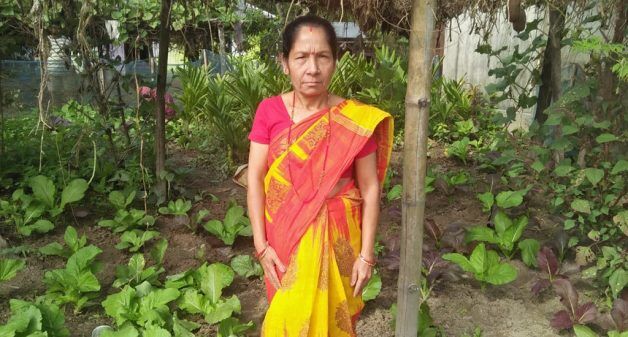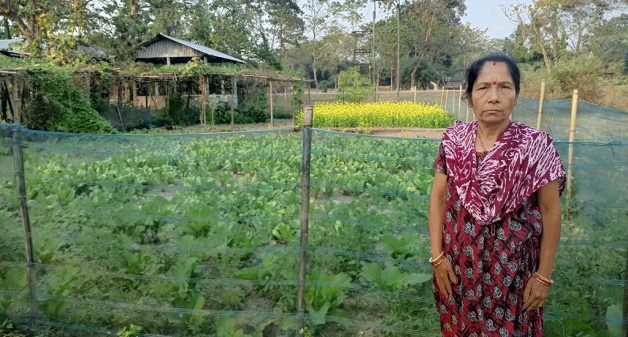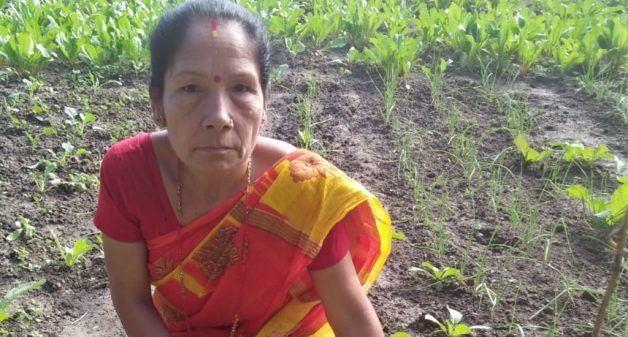
Earning a lakh from half an acre
Blood, sweat and a little land: how the frail but hardy Pushpa Chhetri earns over a lakh from her half-acre plot of land in Assam.

Blood, sweat and a little land: how the frail but hardy Pushpa Chhetri earns over a lakh from her half-acre plot of land in Assam.
Pushpa Chhetri amazes me. She’s so hardworking, she inspires me a lot on a daily basis. I’ve been working with her through my organisation, Seven Sisters Development Assistance (SeSTA) for a year-and-a-half.
Pushpa is a middle-aged mother of two children, one of whom is married. She lives with her son and husband in Juilaga, a village about 20 km from Bongaigaon. She has a bigha and a half of land (about half an acre) near her home.
She is frail but hardy and so self-possessed. I took a senior member of the development world to see her recently. I wanted him to see her two plots of land stuffed with many sprouting vegetables: garlic, chilies, lai patta (a somewhat distant cousin of mustard, Brassica juncea), red sag, bottle gourd, bitter gourd, okra, ginger, cauliflower and other coles and more we could not identify.
The farm did not look very tidy as seeds were planted to make use of maximum area of the land. Since neither Pushpa nor I boasted of any high-sounding technique, like multi-tiered horticulture, I could tell that my senior colleague was sceptical. He later confided that he was “about to let an evaluative comment escape my elite lips” when Pushpa suddenly said that she earned Rs. 400-500 every day from her plots!
Oh, he snapped to attention then! He soon started asking Pushpa all sorts of questions about which crops she grew, when and how much she earned.
Her technique is simple: grow what will grow best in the season and what will have the best chance of being sold at a good price in the weeks after planting.

I could see my colleague doing a quick mental calculation. Even if he took her to be selling, say five days a week, she seemed to earn over Rs 10,000 each month, taking the total earning to over a lakh a year. And with only a small plot.
“We can not make any saleable vegetables in monsoon since it rains so hard here and often the land gets flooded. But in the rest of the nine months, I do have something to sell each day,” she told us, bringing a very fresh looking and sumptuous bunch of lai patta.
She told us that such a bunch was currently selling for Rs. 10 or 12. She sold a few bunches of this each day and it was clearly her “cash cow.”
This lai patta leaf is served boiled in most small restaurants in tribal areas of Assam, Arunachal and Nagaland along with fish or any meal. The demand for this vegetable is perennial and brisk.
When we looked closely, there were a plethora of plants but the soil was free of unwanted weeds. The plant density was so high that no mechanical weeder could be used to clear the farm.
When we asked her who cleared the weed in this very rich per-humid biotic environment, she said, “Who else? My husband does some and I do some.”

The plants looked healthy and the ground clean, so she must be watching each plant like a mother and pulling out every unwanted blade of grass the moment it seemed to emerge from the soil. All done while moving in a squatting position. She pointed to a piece of land, some 15 square feet, said that it took her an hour to weed it that morning. She also waters the plants each evening with a small pump and pipe.
Of course, that’s not all she does. She also manages the house, cooking and cleaning, never mind selling the crops in the nearby market, though often traders come to her. Her daily “market lots” were no larger than a mid-size cane basket. But the prices of vegetables are such that this itself fetches her Rs. 500!
Through all her hard work, Pushpa is able to pay for all her family’s expenses, including marrying off her daughter and supporting her son in his higher secondary school. She even hopes to send him to a college.
My colleague was more than impressed. He said the founder of the International Development Enterprises (iDE) the late Paul Polak – known as the “treadle pump man” the world over – used to say that farmers would come out of poverty if they could earn over USD 1 per square metre of their land.
With an income of over a lakh from half-an-acre of land, Pushpa Chhetri is close to that ideal. In fact, she’s practical proof of Paul Polak’s wisdom.
Rubi Thakuria is a development executive with Seven Sisters Development Assistance, Assam.